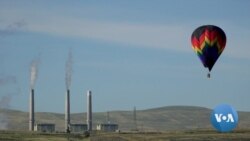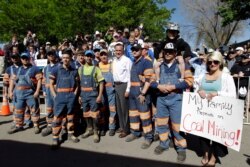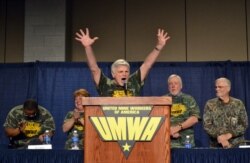In the city of Craig, Colo., population 9,000, the 300 or so jobs at the Craig Station coal-fired power plant are a substantial part of the workforce.
They’re good jobs, with good pay and benefits, said plant electrician Matt Kincheloe.
“Everybody says, ‘Oh, you’re at the plant. Oh, man, that’s a great job.’ You hear that all the time,” he said.
Shadow over the future
But a new law aimed at curbing planet-warming gases casts a shadow over the plant’s future, and his own.
This year, the state passed a law that aims to cut greenhouse gas emissions in half by 2030 and 90 percent by 2050. The law will add an extra push to the market forces driving coal off the electric grid.
“That’s the one that scares me the most,” Kincheloe said. “If there’s no power plant here, what would I do for a living? What would I do to contribute to my family and to help maintain the lifestyle that we have? And what’s going to happen to my community? My little town here in Craig, Colorado, is at risk.”
On the other hand, the entire state is at risk from climate change, according to K.C. Becker, speaker of the state House of Representatives, who co-sponsored the new law.
Rising temperatures and increasing droughts threaten the state’s farmers, ranchers and ski areas, Becker noted, and increasing wildfires threaten lives and property.
“I think if we don’t deal with climate change, we are going to be wrecking the economy,” she said.
The impact of the law is not lost on her, however.
“We know that there are going to be coal plant closures,” she said. “Let’s think very intentionally and proactively about those communities. Is it going to mean displaced workers? Is it going to mean shuttered downtowns? How do we get ahead of it?”
A ‘just transition’
That’s why Becker sponsored a companion measure to the greenhouse gas law that creates the nation’s first government office dedicated to smoothing the transition in coal communities.
Called the “just transition office,” it will be housed in the state department of labor, and it will spearhead efforts to offer worker retraining, supplemental income for workers transitioning jobs and help with economic development for affected communities.
The conflict between green goals and blue-collar jobs is at the heart of the fight over climate change.
The idea of a “just transition,” including helping workers affected by the move away from fossil fuels, has become a key tenet for many climate advocates.
That phrase shows up in the high-profile “Green New Deal,” a proposal to transform the United States to a zero-greenhouse-gas economy. Several Democratic presidential candidates have embraced the proposal.
But major labor unions are skeptical.
United Mine Workers of America President Cecil Roberts noted earlier this month that Congress has been unable to rescue the union’s collapsing health care and pension funds for a decade.
“How do you think we’re going to believe that you’re going to be able to give us a just transition from the coal industry to some other employment?” he asked.
‘A battle we can win’
But in Colorado, the just transition bill passed with union backing.
The support for worker retraining helped win over Rich Meisinger, business manager at the electrical workers union IBEW Local 111.
If someone loses a job at a power plant, “they still have a skill,” he said. “So maybe that skill goes to working on electric motors in windmills, to working on electric motors in battery powered cars, which is our future.
“With a little training,” he said, “we could probably find a transition plan for them.”
Rank-and-file members have their doubts, however.
“I think, in the base, it sounds like a good idea,” said Craig Station electrician Matt Kincheloe. “That all being said, it didn’t talk about funding. … Where are we going to get the money for that? Do I have to move? Do I have to learn a different trade? The re-education bill — well, what kind?”
Meisinger said IBEW members probably would rather he fought to keep the power plant open. And if he were in their position, he said, he would want the same thing.
“But knowing what I know, that’s a battle we aren’t going to win,” he added. “So I want to fight a battle we can win that helps our members out.”
An advisory panel will be setting the just transition office’s agenda in a report due next July. Funding that agenda will fall to future legislative sessions.
Becker hopes Colorado will be an example for other places dealing with those left behind in the energy transition.
“States are going to have to deal with climate change regardless. And then they’re going to have to deal with worker transitions regardless,” she said.
“I’m really excited to see how it works,” she added. “Or, you know, if it works.”













